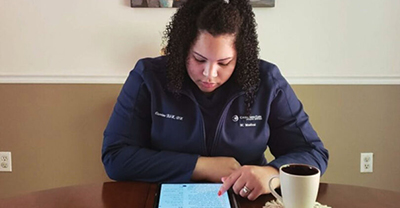Special to NNPA Newswire
When the Omicron variant started emerging around the country, Registered Nurse Currine Smith flashed back to the despair she felt at the beginning of the pandemic.
Now entering the third year of COVID, she describes feeling a sense of dread and anxiety when walking into work. “The scene is quite grim,” she said of the Level I trauma hospital where she works in Delaware. “People feel like the light at the end of the tunnel doesn’t exist anymore.”
Many medical workers like her are exhausted from working through the pandemic.
With variants straining short-staffed facilities across the country, some on the front lines are experiencing added physical, mental and emotional stress. “I’m feeling burnout,” said Smith, who saw her medical floor skyrocket with COVID cases amid the current surge. “The stress and anxiety I feel wears down on me mentally, emotionally and physically.”
What pulled her out of despair in the early phases of the pandemic continues to keep her afloat. She credits her faith as one of Jehovah’s Witnesses for helping her and other health care workers in her religious community endure the ongoing toll of the pandemic.
“Remembering how my faith and relationship with God has sustained me thus far helps me to continue,” Smith said.
She also prays regularly and leans on fellow believers for support. “I pray for you every single day,” said one friend. Without hesitation, her family of faith mobilized with phone calls and texts, and even delivered food to her doorstep to help her get through the crises and not give up.
Smith gets a weekly dose of that encouragement and support at her congregation meetings, held on a virtual platform since the pandemic started.
“Virtual association with those who love and support me helps me to cope and remain joyful through these challenges,” she explained.
American psychological and psychiatric associations, while not advocating or endorsing any specific religion, acknowledge the role spirituality and religious faith can play in coping with distress and trauma.
Lawrence Onoda, Ph.D., a clinical psychologist in Mission Hills, California, noted some ways spirituality can help, including giving people “a positive hope and meaning toward life, comfort by looking for answers and strength from a higher power, and a collective shared experience of support and community.”
Smith finds joy in passing along to others what has helped her. She joins friends online to write or call people in the community with a message of hope from the Scriptures.
She recently participated in a special worldwide campaign to offer the article, “A Better World is Near,” from jw.org, the official website of Jehovah’s Witnesses.
“Sharing that message was a constant reminder that the suffering I see in the hospital is only temporary.”
“The information is always timely and the articles about how to handle stress have given me invaluable pointers on coping skills,” she said. “It’s definitely been a source of comfort for me.”

